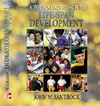 |  Life-Span Development: A Topical Approach John W. Santrock
Cognitive Processes and Development Information Processing
Learning Objectives1.Explain how the information-processing approach emphasizes that individuals manipulate information, monitor it, and strategize about it; how the cognitive processes of memory and thinking are central to the approach; and the similarities and differences between this approach and the cognitive developmental approaches, particularly that this approach is not a stage theory. |
 |  |  | 2.Describe how processing speed increases across childhood and adolescence, increases on some tasks in early adulthood, then slows as individuals go through their later adulthood years. |
 |  |  | 3.Discuss attention in newborns, children, and adulthood, moving from the ability to fixate on a contour, to scanning a pattern, to more cognitive control and selective attention, as well as divided attention on complex tasks. |
 |  |  | 4.Explore the changes in memory throughout the life span, including:- how infants can retain information about perceptual-motor actions, but what is commonly thought of as memory does not occur until the second half of the first year.
- that short-term memory increases in childhood, particularly if children receive appropriate cues or use strategies, and how having knowledge influences memory.
- how using memory and study strategies can help students improve academic performance.
- the developmental changes in memory when moving from younger and older adults, such as:
| younger adults have better episodic memory than older adults | the role that people's belief plays in memory performance | | age declines in retrieving semantic memory, working memory, explicit (not implicit) memory, and perceptual speed | how nonmemory factors (e.g., health, education) influence memory in older adults | | how mnemonics can be used to improve older adults' memory |
|
 |  |  | 5.Discuss the research and concerns about thinking over the life span, including: - childhood issues such as lack of emphasis on critical thinking, children's understanding of numerical concepts, and whether math should be more cognitive or practical, and the similarities and dissimilarities between children and scientists
- adolescence as an important transitional period in critical thinking, noting how decision making increases in adolescence
- the increase of expertise in middle adulthood, how using cognitive skills helps older adults retain cognitive functioning, the increase of practical problem solving in the forties and fifties, and the use of cognitive training to help remediate cognitive decline
|
 |  |  | 6.Understand that metacognition is "knowing about knowing," how strategies benefit children, research on children's theory of the mind, and the continual improvement in metacognitive skills over the life span, noting that older adults tend to overestimate their everyday memory problems. |
|



 2002 McGraw-Hill Higher Education
2002 McGraw-Hill Higher Education